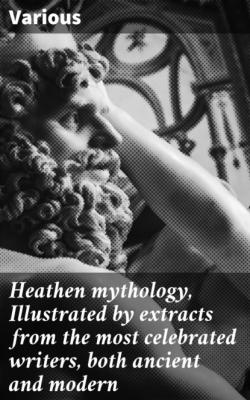ТОП просматриваемых книг сайта:
Heathen mythology, Illustrated by extracts from the most celebrated writers, both ancient and modern. Various
Читать онлайн.Название Heathen mythology, Illustrated by extracts from the most celebrated writers, both ancient and modern
Год выпуска 0
isbn 4057664609885
Автор произведения Various
Жанр Языкознание
Издательство Bookwire
"Ere Saturn's rebel son usurped the skies;
When beasts were only slain in sacrifice;
While peaceful Crete enjoyed her ancient lord;
Ere sounding hammers forged the inhuman sword;
Ere hollow drums were beat; before the breath
Of brazen trumpets rung the peals of death,
The good old God his hunger did assuage
With roots and herbs, and gave the golden age."
Virgil.
———
"The Golden age was first; when man yet new,
No rule but uncorrupted reason knew,
And with a native bent did good pursue!
Unforced by punishment, unawed by fear,
His words were simple, and his soul sincere.
Needless was written law, when none oppressed,
The law of man was written in his breast;
No suppliant crowds before the judge appeared,
No court erected yet, nor cause was heard;
But all was safe, for conscience was their guard:
The mountain trees in distant prospects please,
Ere yet the pine descended to the seas;
Ere sails were spread new oceans to explore,
And happy mortals unconcerned for more,
Confined their wishes to their native shore:
No walls were yet, nor fence, nor moat, nor mound,
Nor drum was heard, nor trumpets' angry sound;
Nor swords were forged, but void of care or crime,
The soft creation slept away their time;
The teeming earth, yet guiltless of the plough,
And unprovoked did fruitful stores allow;
Content with food, which nature freely bred,
On wildings and on strawberries they fed:
The flowers unsown in fields and meadows reigned,
And western winds immortal spring maintained;
In following years the bearded corn ensued,
From earth unasked, nor was that earth renewed;
From veins of valleys, milk and nectar broke,
And honey sweating thro' the pores of oak."
Ovid.
From the gaieties and fêtes which then took place arose the name of Saturnalia, or fêtes of Saturn, which lasted three, four, and five days, and took place in December. All work was stayed, friend interchanged gifts with friend, the preparations for war and the execution of criminals were alike suspended, while masters waited on their slaves at table, in remembrance of the ideas of liberty and equality, which existed in ancient days.
Janus was represented supported by a staff, with a key in his hand, as he was believed to be the inventor of doors and of locks. From his name came the month of January. He worshipped at twelve altars, to represent the twelve months; and wore occasionally four faces, as tokens of the four seasons of the year. At Rome, in which his temple was placed, it was open in the time of war, and shut during that of peace.
Saturn, or Time, is represented sometimes on a flying chariot, and sometimes on a throne, under the figure of an old and bearded man, severe in aspect, thin and yet robust, his eyes marked by a stern light; a veil on his head, and a serpent round his waist; while in his hand he carries a harp. In later times he is represented with a scythe.
"Unfathomable sea! whose waves are years;
Ocean of Time, whose waters of deep woe
Are brackish with the salt of human tears;
Thou shoreless flood, which in thy ebb and flow
Claspest the limits of mortality!
And sick of prey, yet howling on for more,
Vomitest wrecks on its inhospitable shore.
Treacherous in calm and terrible in storm,
Who shall put forth on thee,
Unfathomable sea?"
Shelley.
With his scythe and with his wings, our eyes are familiar, as, to the present day, he is never drawn without these accompaniments.
"To one that marks the quick and certain round
Of year on year, and finds that every day
Brings its grey hair, or bears a leaf away
From the full glory with which life is crowned,
Ere youth becomes a shade, and fame a sound:
Surely to one that feels his foot on sand
Unsure, the bright and ever visible hand
Of Time, points far above the lowly bound
Of pride that perishes: and leads the eye
To loftier objects and diviner ends;
A tranquil strength, sublime humility,
A knowledge of ourselves, a faith in friends,
A sympathy for all things born to die,
With cheerful love for those whom truth attends."
Laman Blanchard.
This fable is easy of explanation. Time is the child of heaven and earth; he has wings because he flies rapidly, a scythe because he destroys all, an hour-glass to measure his course equally; and the serpent is the symbol of eternity, which has neither a beginning nor an end. He slew his father, because, the world and time once created, he could exist no longer; he devoured his infants because time destroys all, and he threw them from his stomach because time returns with the years and days; and this part of the fable is also an image of the operations which nature accomplishes under the influence of time. He did not devour Jupiter, as he represents the celestial regions, nor Juno, she being the prototype of the air: Time, mighty and all-destroying as he is, having no influence over the elements.
C Y B E L E , V E S T A.
———
This goddess was the daughter of Uranus, being the sister and wife of Saturn. As soon as she was born, she was exposed on a mountain, but being preserved and suckled by some of the wild beasts of the forest, she received the

